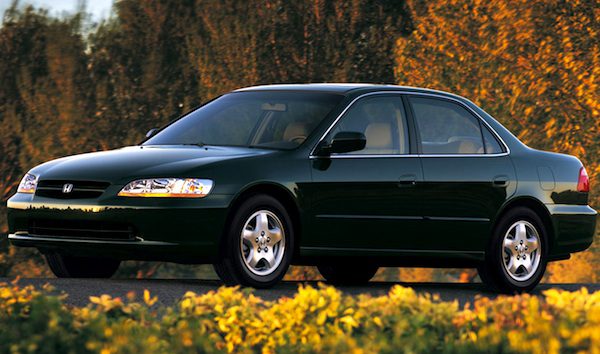BREAKING: NHTSA Issues Emergency Notice for Certain Takata Airbag-Equipped Vehicles; Rupture Rate is 50 Percent

The U.S. National Highway Traffic Safety Administration broke from its orderly recall of potentially dangerous Takata airbags today to warn drivers of certain 2001–2003 Honda and Acura models.
New tests show a certain subset of the faulty airbags, linked to 14 deaths worldwide, have a much higher risk of exploding in the event of an accident — a likelihood of up to 50 percent. The NHTSA is urging owners of these vehicles to avoid driving them.
Because of the age of the models, the agency issued an appeal to the public to help track down unrepaired vehicles.
The affected models are: 2001–2002 Honda Civic and Accord, 2002–2003 Acura TL, 2002 Honda CR-V, 2002 Honda Odyssey, 2003 Acura CL, and 2003 Honda Pilot.
The list comprises about 313,000 vehicles which came from the factory with a manufacturing defect in their airbag inflators. These models were recalled for the defect between 2008 and 2011, but only 70 percent of the vehicles actually returned to be fixed.
According to the NHTSA: “Ruptures are far more likely in inflators in vehicles that spent significant periods of time in areas of high absolute humidity — particularly Florida, Texas and other parts of the Gulf Coast. By comparison, testing performed on similarly aged recalled Takata inflators that do not have the same manufacturing defect shows rupture rates at less than one percent.”
Using uncharacteristically dire language, the NHTSA stated, “The risk posed by the airbag inflators in these vehicles is grave, and it is critical they be repaired now to avoid more deaths and serious injuries.”
The agency asks for the public and the media’s help in finding the remaining vehicles, and urges owners to visit SaferCar.gov to check whether their vehicle underwent the earlier recall.
Roughly 70 million Takata airbag inflators have so far been recalled, though these models are an urgent priority. Studies show that time, temperature and humidity degrades the ammonium nitrate propellant inside the inflators, which can cause the airbags to explode during a crash and send shrapnel into the vehicle’s occupants.

More by Steph Willems
Latest Car Reviews
Read moreLatest Product Reviews
Read moreRecent Comments
- Wjtinfwb 157k is not insignificant, even for a Honda. A lot would depend on the maintenance records and the environment the car was operated in. Up to date maintenance and updated wear items like brakes, shocks, belts, etc. done recently? Where did those 157k miles accumulate? West Texas on open, smooth roads that are relatively easy on the chassis or Michigan, with bomb crater potholes, snow and salt that take their toll on the underpinnings. That Honda 4 will run forever with decent maintenance but the underneath bits deteriorate on a Honda just like they do on a Chevy.
- Namesakeone Yes, for two reasons: The idea of a robot making decisions based on algorithms does not seem to be in anyone's best interest, and the thought of trucking companies salivating over using a computer to replace the salary of a human driver means a lot more people in the unemployment lines.
- Bd2 Powertrain reliability of Boxer engines is always questionable. I'll never understand why Subaru held onto them for so long. Smartstream is a solid engine platform as is the Veracruz 3.8L V6.
- SPPPP I suppose I am afraid of autonomous cars in a certain sense. I prefer to drive myself when I go places. If I ride as a passenger in another driver's car, I can see if that person looks alert and fit for purpose. If that person seems likely to crash, I can intervene, and attempt to bring them back to attention. If there is no human driver, there will probably be no warning signs of an impending crash.But this is less significant than the over-arching fear of humans using autonomous driving as a tool to disempower and devalue other humans. As each generation "can't be trusted" with more and more things, we seem to be turning more passive and infantile. I fear that it will weaken our society and make it more prone to exploitation from within, and/or conquest from the outside.
- JMII Based on the human drivers I encounter everyday I'll happily take my chances with a computer at the wheel.The highway driver assist system on my Santa Cruz is great, it can self drive perfectly in about 90% of situations. However that other 10% requires you to be in control and make decisions. I feel this is the problem with an AI driving a car, there are times when due to road construction, weather conditions or other drivers when only a human will know what to do.


































Comments
Join the conversation
Hondas always had airbag issues, before Takata it was issues with the SRS computer, issues that m8ght make them simply not activate. Of course it doesnt help that 80% of them are patched up wrecks.
Does anybody know if the front passenger and/or the side airbags are affected with the exploding propellant? 2002 Honda Accord. My driver's airbag has already been replaced.